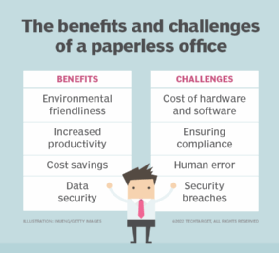
Getty Images/iStockphoto
Explore the benefits and challenges of paperless offices
While transitioning to a paperless office can be costly, the benefits of paperless are enough to justify the cost for most organizations.
Freeing office staff from searching through stacks of paper to find a single document or dealing with overflowing filing cabinets has been one of the great solutions modern offices can strive toward.
But even with this motivation, digitizing everything from bank statements, medical records and other paper-based forms can be intimidating for many and, in most cases, requires a thorough evaluation of the true benefits of paperless.
What is a paperless office?
Generally, the term paperless office covers any practice that reduces an organization's reliance on paper for its day-to-day business operations. These documents could be incoming forms from vendors, suppliers or customers, or any information not generated or transmitted electronically to an office.
Regulatory compliance has been the driving factor for some industries to shift from paper to digital. It forced many organizations to either move to electronic records or face penalties and loss of financial support. For example, the Affordable Care Act provided medical offices with the backing to invest in the infrastructure needed to go paperless.
Benefits of a paperless office
Reducing the amount of paper an organization uses translates to several distinct advantages. At the top of that list, it can lower business costs while simultaneously improving staff productivity and efficiency. Some of the other benefits of paperless include the following:
- improved collaboration when using electronic documents to share information, especially with those not in the same physical location;
- improved record access tracking and the elimination of unauthorized access to information;
- regaining physical space by removing the need for records rooms;
- reduced errors associated with illegible handwriting and shifting to electronic documents;
- the ability to capture discrete data and perform data analysis;
- scanning legacy documents to capture them digitally and make them more easily searchable;
- improved staff productivity; and
- data extraction capabilities and intelligent routing based on content.
Challenges of a paperless office
Despite the benefits of paperless, there are some drawbacks that hinder some organizations from fully implementing a paperless office, including the following:

- Many organizations still use paper documents, and converting them to a digital format can be burdensome.
- Using a digital system can slow down some workflows for employees who are not as efficient with the software.
- Digital systems, if not properly backed up and protected, can experience costly data loss.
- Some regulations, such as HIPAA and legal contracts, require records to be kept in paper format for several years.
- Applications and systems needed for digital recordkeeping can be costly.
- Ransomware attacks and other security threats are affecting more and more organizations.
- When scanning old documents, the transition time can leave offices in a hybrid model, where employees must use paper documents and digital records simultaneously.
Deciding to go paperless
When evaluating whether to move toward a paperless office, businesses should take steps to ensure that the organization makes the right decision, including the following:
- Identify the requirements and opportunities associated with going paperless and its effect on the business.
- Identify all the risks associated with going paperless.
- Determine the investment needed to implement the system.
- Evaluate other businesses that have adopted a similar path toward a paperless office and determine their overall position on the initiative.
- Gain leadership buy-in to help push the change across the organization or business units.
Going paperless is generally seen as a move in the right direction as organizations attempt to keep up with software advancements that slowly eliminate the need for paper. While the process can seem daunting for those still dealing with a tremendous amount of paper, the benefits of a paperless office can make it worthwhile.








